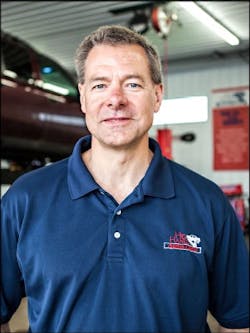Ed Doerner says one of the worst days of a single mother’s life is when she loses her car.
At His Hands Auto Care, he turns it into one of the best days of her life.
That’s because the Messiah Lutheran Church senior pastor, who opened up His Hands Auto Care with general manager Wes Allison, follows the horrible news about condemning an owner’s car with some great news.
“After they cry because we’re forced to condemn their car for being unsafe, Wes will take them outside,” Doerner says. “He’ll point to the lot of cars and ask, ‘Will any one of these cars fit your needs? Because you can pick one out.’ We take their old car as payment, we scrap it out, and we put them in a new car free of charge.”
Doerner and Allison have dedicated the auto care shop, located in Midland, Mich., to helping single parents and low-income families living in poverty, offering discounted labor and selling donated cars at a discounted price.
“We did not realize until we started this how unsafe the cars are that are out on the road,” Doerner says. “And you should see what people drive in with. We don’t know how they made it here. The brakes are shot, the gas tank is dripping. We see the most unsafe cars, and you just don’t realize how unsafe the cars that are driving all around you are. And now they can come in and have their cars fixed.”
His Hands Auto Care
Location: Midland, Mich.
Size: 5,000 square feet
Staff: 7 (4 full-time technicians, 1 part-time technician, 1 general manager, 1 office worker)
Average Monthly Car Count: 85
Annual revenue: $300,000
Fresh off its two-year anniversary, the shop has managed to not only help hundreds of individuals living below the poverty line, but, amazingly, break even financially.
Down and Out
When Doerner sees someone in trouble, he doesn’t stand around asking questions—he fixes the problem.
The problem Doerner saw? During a community-partnered discounted oil change offered by the church three years ago, the staff was unfortunately forced to condemn six cars unsafe for driving.
“When our mission pastor came back and told me that, I asked what he did,” Doerner says. “He didn't know what to do except cry and pray and send them on their way. And I wasn’t OK with that.”
Thus began a campaign to find a local repair shop that would allow the church to use its facilities on the weekend to help low-income individuals. When nobody jumped in to help, Doerner decided he’d open his own shop.
After gathering donations from local foundations and businesses, including $100,000 from a close friend, Doerner broke ground in November 2012, and finished the state-of-the-art, 5,000-square-foot shop on the church’s tax-exempt property in May 2013.
“People are usually surprised when they walk in and say, ‘Holy smokes! This is a garage. We expected a pole barn with a dirt floor,’” Doerner says. “And here we got seven lifts, alignment racks, tire changers. We're a full-service garage.”
Doerner also hired on Allison, who grew up fixing cars and, at the time, had been educating emotionally impaired children in Detroit.
“Ed didn't really want to hire somebody who had been running a shop for a long time,” Allison says. “I think he wanted to give someone a fresh start and get someone who would handle people differently.”
Allison was motivated to leave his post and help Doerner because he could relate to low-income families that lose a car.
“I've been down and out before,” Allison says. “I've been without a vehicle, and the crazy thing is, when I was going to school, I had zero money. A good friend of mine gave me their car. So I've been there and I try to put myself in their shoes and really not judge anyone for what kind of car they drive or what they’re wearing. People just need help.”
The 1-for-1 Ratio
It’s been a learning process for Doerner and Allison. When the shop opened two years ago, those who were able to prove through the local Salvation Army that they were within 200 percent of the federal poverty guidelines, which is $20,000 for a single-family home and another $9,000 for each dependent, got the ultimate discount: free labor.
However, after turning a loss after their first year, the His Hands Auto Care team, which consists of four full-time technicians and a part-time volunteer, started to charge $10 an hour, which allowed the business to break even after the second year.
“As soon as we get to a point where we’re profitable enough, I would like to get back to free labor,” Allison says. “Ten dollars isn't much, but my heart would really like to see us get back to offering free labor.”
Through trial and error, His Hands has devised a system that allows the business to remain stable financially and help low-income individuals.
The shop has a “1-for-1” policy, which means for every discounted job it performs for a “client,” the shop must balance it with a job for a “customer” at the normal labor rate of $72 per hour.
In January 2015, the shop performed 80 discounted jobs, versus 36 normal-rate jobs. That’s because during their first year of business, Doerner and Allison tracked the client-to-customer trends and noticed that more customers visited the shop during the summer months. By tracking how much they take in during their busiest months they’re able to transfer the profit to helping more clients between October and May.
The goal for each month is to at least break even. If the shop starts to dip below the profit line, His Hands may have to push back a client’s appointment a few days to make up the money.
“It really does drive a lot of business to us, because they realize, ‘Wow, I can help someone out by getting my car repaired there?’" Allison says.
“By doing it this way, we can sustain it long term,” Doerner adds. “We don't apologize for it. We have to do it if we want to sustain this. If we close, we can't help anybody. If we do this, everybody gets help, and then it's just a matter of waiting.”
Donating Cars
Perhaps the shop’s most significant achievement is what Doerner and Allison call their “car donation program,” which either gives away or sells discounted cars, brightening the lives of over 25 families since the shop opened two years ago.
“It’s actually really amazing that we have this car donation program,” Allison says. “Of all we do, this is the most beneficial to the community. And it’s actually good all around—for the donor, the receiver and our business.”
Getting a full tax write-off, a donor can sell their car to His Hands for the Kelley Blue Book value. Then the shop will fix the car and sell it for the cost of parts.
“So when most cars come in, they need basic things like ball joints and brakes, so I sell most cars for about $300 to $600,” Allison says. “Somebody actually donated a 2005 Pontiac Grand Prix in great condition that Blue Book’ed for $3,100. I did a brake job on it and sold it for $300—10 percent of what it was worth. That was huge for the person who bought that car.”
While the car donation program makes it tougher for the shop to break even, the charitable value of the program has gotten the word out about the shop’s altruistic vision, thus increasing its customer base.
“I definitely think a shop would benefit from a car donation program,” Allison says. “It’s really not that difficult to get set up. Through the state you've got to get a dealer's license, which a lot of car shops already have, and then a letter from the state that says you're certified to have cars donated to you. That's really simple. Selling the vehicles for the cost of parts would be the toughest part, but I think that would be manageable.”
Making a Difference
In addition to helping low-income families, Doerner says His Hands Auto Care has actually helped improve other auto care facilities in Midland.
“When we first opened, there was a lot of criticism that we were going to be taking business away from other garages,” Doerner says. “But here’s the thing: When a client goes to another garage, [the owner] has two choices—either he has to take a hit and charge less out of his own pocket, or he has to send them away. We have given him a third option. That way, they're cared for and he doesn't feel guilty for sending them away or take a hit financially.”
Doerner says His Hands has partnered with several local businesses, such as a local shop that donates its best tires to His Hands once a month. By working with other garages, Allison says His Hands is able to promote the for-profit businesses in the area.
“There's a garage a quarter of a mile down the road,” Allison says. “We have a great working relationship with him because he gets what we're doing and he loves us, and all the people that he’d have to dig into his own pocket to help, he sends them to us. So it's actually provided a lot of relief for other garages.”
As a manager, Allison says that the knowledge he’s gained about running a business has paled in comparison to the amount of empathy for humanity he’s accrued through changing lives each and every day.
"Everybody is fighting a battle you don't know about," Allison says. “So anytime somebody comes into a shop, even if they're kind of on edge or mean, I just try to think, ‘I don't know what's going on in their lives.’ I just try to keep a fair and balanced idea of everyone who walks through the shop.
“I'm not perfect. There are times I don't want to deal with it. But I try to treat everyone as an equal. We can all be in better circumstances. By the grace of God I've been blessed with a good job. I could have been in their shoes.”

